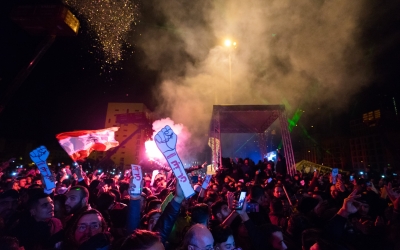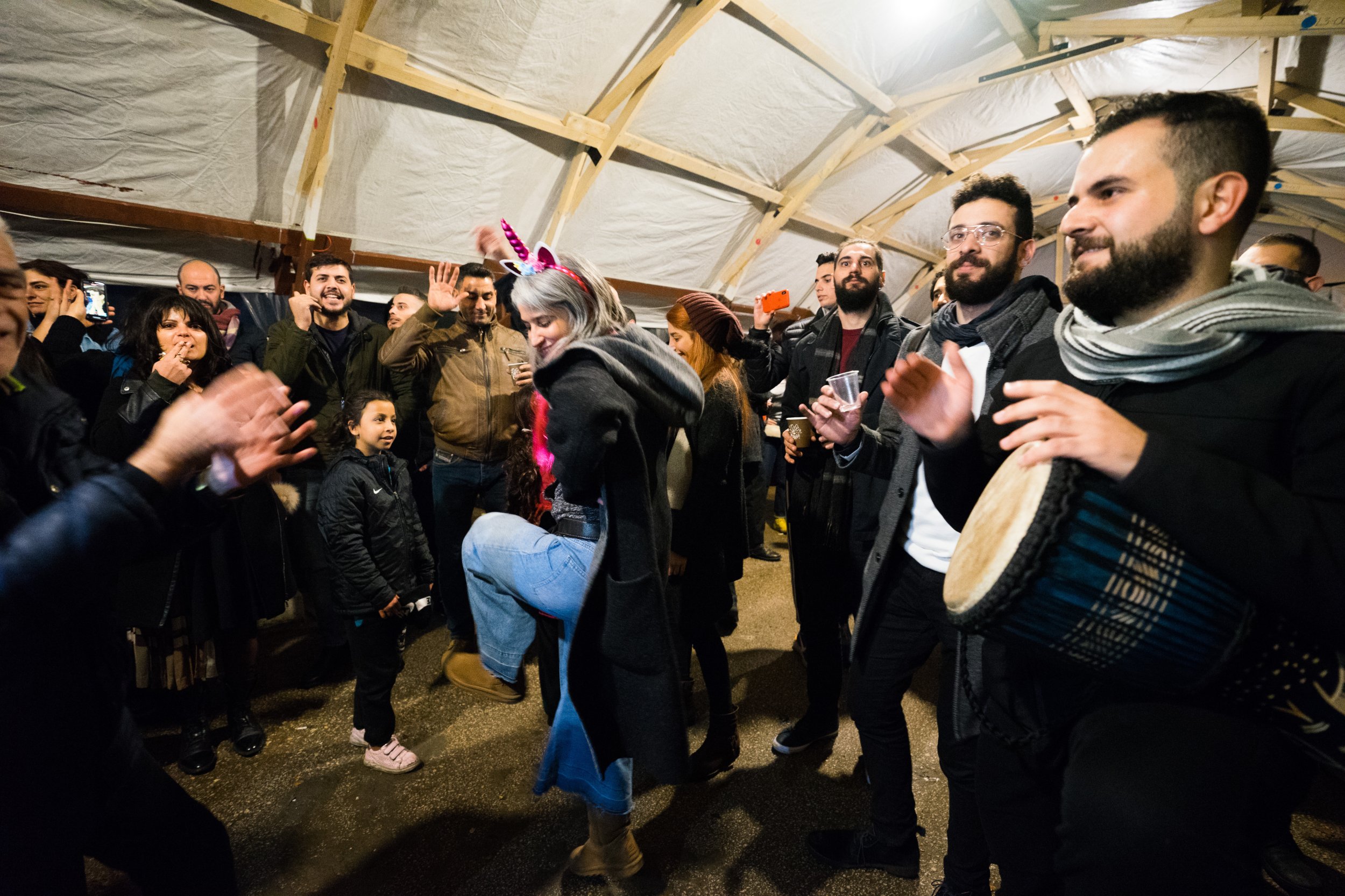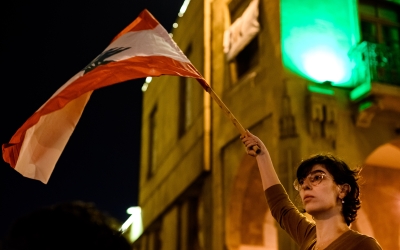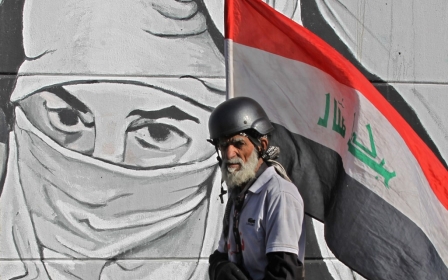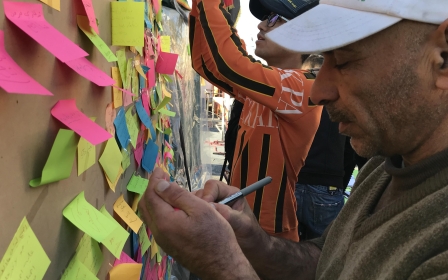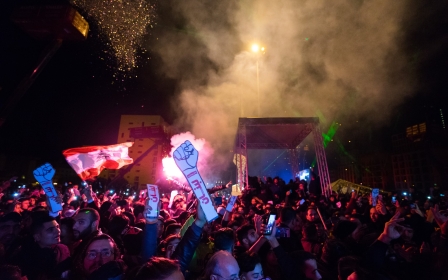For 2020, Lebanese protesters vow to make new year revolutions
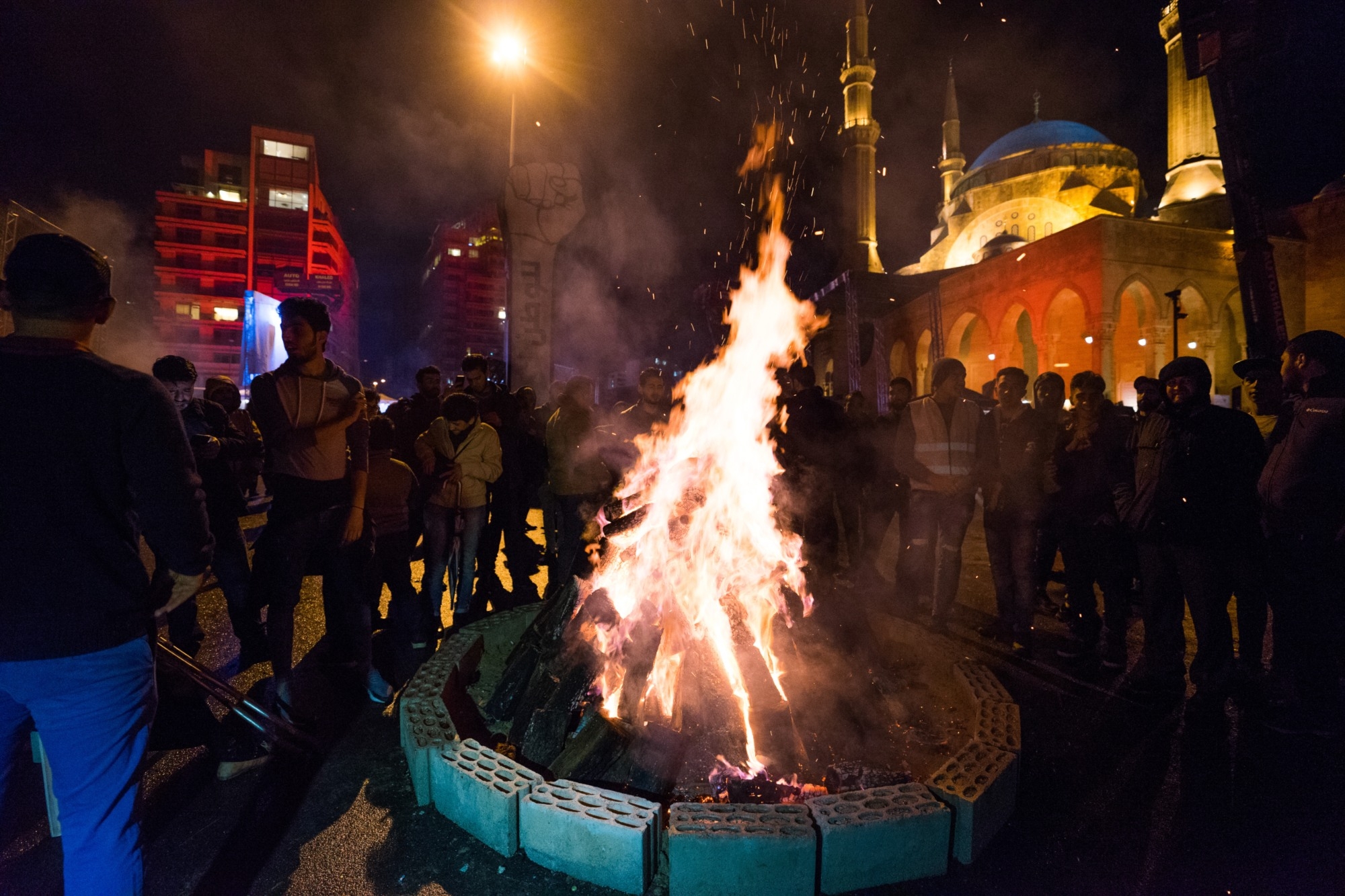
“Down with the rule of the banks!” singer Sandy Chamoun chanted with the crowd as her band, The Great Departed, finished their set and got off the stage in downtown Beirut’s Martyrs Square on New Year’s Eve.
The crowd huddled together in the cold, chanting popular protest slogans while on stage a screen flashed vignettes of the protest movement that first erupted 76 days ago on 17 October.
New MEE newsletter: Jerusalem Dispatch
Sign up to get the latest insights and analysis on Israel-Palestine, alongside Turkey Unpacked and other MEE newsletters
Alongside these images, demonstrators could read: “Happy New Lebanon.”
“We talked about spending the nights in squares, rather than partying,” Saseen, one of the organisers of the evening told Middle East Eye.
The popular movement that has swept across the country has united calls for the downfall of Lebanon’s political system and for a much needed economic reform.
As the country’s economic situation has only gotten worse in the past few months, demonstrators oscillated between concern and determination as they geared up to enter 2020.
All invited, except the status quo
A stone’s throw away from Martyrs Square, a cluster of tents set up by protesters, often demolished and burned to the ground by political partisans, also stood as a meeting space for those wishing to ring in the new year.
While some protesters played cards, listened to music, took pictures by protest graffiti or socialised, the gathering turned into an unexpected party of its own.
A derbakeh drum suddenly appeared; then a tambourine, some pots and pans, and soon people gathered singing and dancing along to revolutionary songs and chants.
As the crowd grew inside one of the white tents, Saseen and other volunteers took shifts serving homemade food. Children selling bottles of water on the streets found shelter in the tent and joined in on the festivities.
“[We] shared with anyone who wanted it,” Saseen said. “[There were] many people passing through the tent.”
The convivial and rebellious atmosphere in downtown Beirut did not convince everyone.
Jad Abou Jaoudeh, the head of news and political programmes for Lebanon’s OTV channel, owned by President Michel Aoun’s Free Patriotic Movement, mocked the event.
“Revolutions and a night out don’t mix,” he said in a tweet - to which one protester responded: “Nobody invited you in the first place.”
Reclaiming downtown Beirut
Downtown Beirut has been a key meeting place for protesters in Lebanon, and New Year’s Eve was no exception.
Aside from its proximity to parliament and the Grand Serail - the government headquarters - the capital’s historical commercial district was turned into a privatised luxury ghost town during its post-civil war reconstruction.
Due to rampant construction and privatisation, Beirut sorely lacks in public spaces. For many, the demonstrators’ tent city downtown - with community kitchens, legal support services, recycling and open discussion spaces - is a symbol of reclaiming space that had been taken away from them.
“Public spaces are meant to be meeting points...and are also open for people to protest, celebrate, and express [themselves],” Ghinwa Abu Zein told MEE.
Abu Zein left Beirut for Amsterdam nearly five years ago to find better work opportunities. She has since helped organise solidarity protests there, and returned to her home country to spend the end of the year with family.
Describing much of life in Lebanon as “segregated between different components of society” - whether along sectarian or class lines - she feels the uprising and its consolidation in downtown Beirut has been an opportunity to counter that.
“This revolution is giving us the opportunity to literally ‘see’ each other and celebrate the new year together,” she explained. “They [the country’s rulers] never wanted us to meet or unite.”
A new decade of uncertainty for Lebanon
Lebanon has not gently gone into the new decade, amid a nose-diving economy and ongoing political paralysis between its embattled ruling parties and the protest movement.
Lebanon is facing its worst financial crisis since its 15-year civil war, as its public debt stands among the largest in the world.
Credit rating agency Fitch downgraded Lebanon’s rating for a third time in 2019 in mid-December to “CCC”, indicating that debt restructuring is “probable” in light of the political, economic, and financial situation. Standard and Poor’s also slashed Lebanon’s credit rating in December anticipating a “negative” outlook.
Meanwhile, new Hezbollah-backed Prime Minister-designate Hasan Diab has not been viewed kindly by protesters, as political paralysis between ruling parties stall the formation of a new cabinet.
Lebanese banks continue to hoard currency, leaving people struggling to withdraw funds, with some banks preventing customers from taking out more than $100 a week.
The situation has become so dire, a new group was formed in order to protest inside bank branches until people are allowed to withdraw the money they need or cash their salary cheques.
'We need to believe it's important to be happy, not just to survive'
- Saseen, demonstrator
Given the strained economic context, it came as no surprise that at midnight, new year’s greetings eventually turned into angry and emotional slogans against Lebanon’s government and banks.
Saseen, though not surprised, admitted that the overall situation has dampened the festive atmosphere
“People were laughing and drinking, but there was also planning and discussions about the future,” he admitted, though he did not appear fazed.
“We need to believe it's important to be happy, not just to survive.”
Dana, another fellow protester out that evening, said she felt hopeful despite the hardships.
"It’s been inspiring to see such a broad cross-section of society represented these two months since the start of the revolution,” she told MEE. “We enjoyed the opportunity to celebrate the accomplishments of the revolution so far and prepare for a difficult year ahead.
“It leaves me with more hope, especially seeing the sense of collective responsibility which contributed to the success of the evening. We all have a stake in seeing the revolution succeed."
Middle East Eye delivers independent and unrivalled coverage and analysis of the Middle East, North Africa and beyond. To learn more about republishing this content and the associated fees, please fill out this form. More about MEE can be found here.


